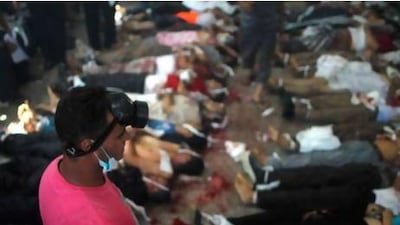BEIRUT // Politics has failed in Egypt.
That is the painful lesson learnt from yesterday's bloodshed. For 41 days since Mohammed Morsi was deposed by the military after huge protests against his government, Egypt's polarised factions have recklessly escalated confrontations with each other.
From the very start, neither side was inclined to find a political solution to a stand-off that was destined to play a leading role in Egypt's prosperity, security and stability in the years to come. The removal of Mr Morsi inspired both intense pro-military sentiments and devastating victimhood, an arrangement that made both sides believe they could emerge victorious without compromise.
The result was a mutual unwillingness to be swayed by diplomats from the US, European Union and Gulf states, all pressing for a deal to be struck to avoid more fighting.
Nor could Ahmed El Tayyeb, the Grand Sheikh of Al Azhar - the Sunni's world's most revered centre of religious learning - persuade them to come together. Sheikh El Tayyeb yesterday said he had no prior warning of the military crackdown.
Evidence of the unyielding nature of the opposing factions is easily found in their rhetoric.
What began as legitimate criticism of Mr Morsi's efforts to consolidate power and his failures in making life better in Egypt transformed into allegations from his opponents that the Brotherhood, where he was a former senior official, is a terrorist organisation, bent on tearing the country apart unless an Islamic theocracy is installed.
The Brotherhood has morphed from the country's most powerful political group into a band of martyrs, casting themselves as the country's only democrats and lacking all ability to understand how their actions provoked popular fury.
And the military has returned to centre stage in political affairs, their very presence a rejection of the idea, once so popular, that what Egypt needed after Hosni Mubarak was more democracy.
Gen Abdel Fattah El Sisi, wearing dark sunglasses, appeared unaware of just how familiar he looked standing on a stage last month while calling on Egyptians to give him a "mandate" to confront "terrorism". Arab autocrats have struck the same pose many times over.
With consequences that imperil Egypt's rapidly unravelling stability, both sides are playing into each other's hands, clinging to clichés about the other - and delusions about themselves.
With authoritarian governance dominating most of Egypt's existence as an independent nation, it was always going to be an uphill climb in post-Mubarak Egypt to achieve some semblance of normal, representative politics, even more so because the difficult work of reforming anachronistic institutions - the pillars for any such system - had barely started.
The unbending self-conceptions of these two powerful forces in Egyptian life has made it impossible. At risk in this maelstrom is not just the possibility of holding on to the country's nascent democracy, but also the revolutionary goals of the 2011 uprising.
When protesters first poured into Tahrir Square on January 25, 2011, they chanted for greater protections from the security apparatus, greater distribution of wealth and an end to the strongman style of government that stunted Egypt's development for three decades.
Those causes have been drowned out by the street battles of the past five weeks, especially yesterday's violence. The hope now is only that they will not be irrevocably lost.
bhope@thenational.ae
* Bradley Hope is the former Cairo correspondent for The National
twitter: For breaking news from the Gulf, the Middle East and around the globe follow The National World. Follow us

